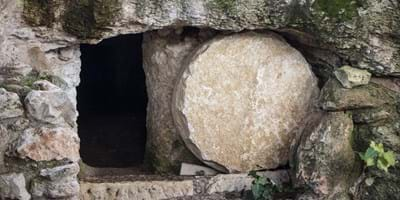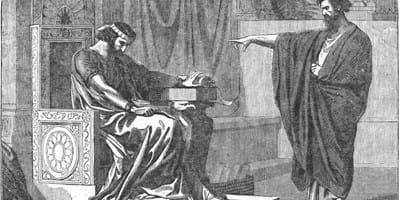Many worthwhile books consider this aspect of the subject and this website also has a very good article. However, we also need to ask ‘What does the resurrection prove?’. In basic terms; ‘The resurrection: So, what?’. What is its relevance to me and you some 2,000 years after the event?
Whilst many implications arise from the resurrection of the Lord Jesus, we are only going to consider three of them. Each point is taken from an apostolic sermon, Peter in Jerusalem, Paul in Athens and Paul in Antioch.
1. The Word of God is true
In Acts 2:22-36, we read that Peter, who had recently denied that he knew the Lord Jesus, stands up in Jerusalem and boldly proclaims the death, burial, resurrection and exaltation of the Lord Jesus.
One major point from Peter’s sermon was that the life, death, resurrection and exaltation of the Lord Jesus was prophesied many years before it occurred.
In Acts 2:25, Peter speaks of how David had written in Psalm 16, some 1,000 years earlier, concerning the Lord's life, death, resurrection, and glorification. As to His life, David described one who lived in uninterrupted fellowship with His Father and his whole being was filled with joy and hope (Acts 2:25-26). David foresaw that following death God would not leave His soul in Hades, nor would He allow the body of His Holy One to see corruption (Acts 2:27). In other words, the soul of the Holy One would not be left in the disembodied state, neither would His body be permitted to disintegrate.
Peter argues that David could not have been saying these things about himself, because his dead body had seen corruption. His tomb was well known to the Jews of that day. They knew David had not been raised.
David, Peter states, knew that God had promised to raise up one of his descendants to sit on his throne forever. David realised that this one would be the Messiah, and that though He would die, His soul would not be left in the disembodied condition, and His body would not decay.
In Acts 2:32-33 Peter repeats an announcement that must have shocked his Jewish audience: the Messiah of whom David prophesied was Jesus of Nazareth. God had raised Him from among the dead, and the apostles could all testify, for they were eyewitnesses to His resurrection.
"The resurrection proves that God’s word is true and utterly reliable. Such detailed and fulfilled prophecy points to a divine author."
2. Righteous judgement is near and certain
The resurrection of Jesus Christ from the dead proves that there is a judgment day coming.
On Mars Hill, Paul, a former persecutor of Christians, declared:
“The times of ignorance God overlooked, but now he commands all people everywhere to repent, because he has fixed a day on which he will judge the world in righteousness by a man whom he has appointed; and of this he has given assurance to all by raising him from the dead." (Act 17:30-31)
Paul's declaration made the resurrection of Christ the God-given assurance of the coming judgment.
But how does the resurrection of Christ give assurance of coming judgement?
The bodily resurrection of the man Jesus carries implications for all human beings of all time – of every race, nation, language, and culture. God raised one and He can raise all. For each person there is a coming judgement and Jesus Christ will judge. Every fact, detail and circumstance will be known and is known. All that is hidden will be open and it will be a judgement without partiality and at a time that is fixed.
No wonder then that Paul calls on his listeners to repent. In the past God did not intervene and judge the world. In His patience and forbearance, He overlooked those times of ignorance (Acts 17:30). And even when He did send His Son into the world, it was not in order that He should judge the world, but that He might save the world (John 12:47). He did this by dying, so that forgiveness of sins could be possible and sinners could be saved from divine judgment.
"The resurrection proves that righteous judgement is near and certain."
3. Forgiveness of sins is possible
In Acts 13:35-39, Paul is preaching at Antioch and states:
"Let it be known to you therefore, brothers, that through this man forgiveness of sins is proclaimed to you, and by him everyone who believes is freed from everything from which you could not be freed by the law of Moses."
The word "freed" means to be pronounced just or righteous. In this instance it refers to a declaration by God whereby He declares a believing sinner to be righteous in His eyes.
The resurrection of Jesus Christ from the dead proves that every believer in Christ is justified from all things. We read in Romans 4:25 that Jesus "who was delivered up for our trespasses and raised for our justification." More literally, "He was delivered up because of our trespasses (that is, because we had trespassed), and was raised because of our justification (that is, because we would be justified)."
But how does the resurrection prove that the believer is forgiven of all sin and can be just in God's reckoning?
On that first Easter, He offered up His life on the cross of Calvary as a ransom for many (Mark 10:45). But there still remains a question, "Will God accept the sacrifice which has been offered?"
When God raises Christ triumphantly from the dead it is as if He proclaims to the whole universe, "I have accepted the sacrifice which Jesus made." The resurrection proclaims the full endorsement and acceptance of Holy God on Jesus Christ’s sacrifice on the cross. The resurrection was a confirmation that God had accepted the sacrifice of Christ as meeting all the demands of His Holiness.
"The resurrection proves that forgiveness of sin is possible for anyone, and is certain for every who turns in repentance and faith in the Lord Jesus Christ."



























